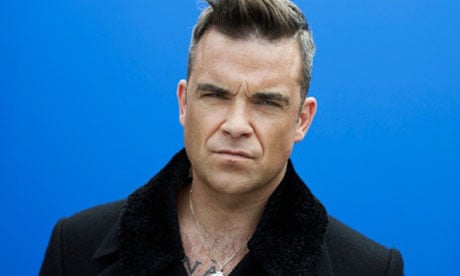Robbie Williams' ninth solo album arrives in a blaze of bullishness. Everything about it screams "comeback": from its title to the lyrics of its opening track ("they said … the magic was leaving me – I don't think so") to its advance publicity. "Take the Crown is the big, brash, confident Robbie Williams pop record that his fans have been longing for," offered one preview approvingly quoted on the singer's website.
It's at this point that anyone keeping an eye on Williams' career over recent years might be forgiven for feeling a sense of deja vu: hang on, wasn't his last album meant to be that as well? Reality Killed the Video Star from 2009 was, Williams said at the time, an album that "ticked all the boxes", following 2006's career-derailing Rudebox: "It's a big pop record," added his manager David Enthoven. "We've got four or five smash hits. And if you're worried he's rapping on it – he's not." It appeared to do the trick: a year after its release, it was still the eighth-biggest selling album across Europe. Now, a little confusingly, Williams has claimed that Reality Killed the Video Star was "half-arsed": "I had intentionally and unintentionally not managed to write a hit," he said recently. "I can take my eye off the ball sometimes and not concentrate. Must do better as they said at school. And I will this time."
It's all a bit peculiar, but then anyone who's been keeping an eye on Williams' solo career over recent years might note that "a bit peculiar" could be its motto. A scrappy, undercooked pop album greeted in some quarters as if it were the most perplexingly avant-garde artistic statement since Lou Reed put out Metal Machine Music, Rudebox was the kind of disaster other artists would spend their entire careers working towards: it went to No 1 in 14 countries. As with Reality Killed the Video Star, its supposed failure tells you more about the sheer scale on which Williams' early-noughties "imperial phase" played out than the actual performance of the albums themselves. But as Neil Tennant, who coined the term, would doubtless tell you, the one thing all artists' imperial phases have in common is that they come to an end. Fashions change, tastes shift, the artist's grip on public imagination slackens a little.
If nothing but that kind of success will do for Williams, Take the Crown finds itself set a potentially insurmountable task. Still, if it fails to replicate it, it won't be for want of trying. It lines up a pretty stellar team, among them U2 and Snow Patrol producer Jacknife Lee and arranger Owen Pallet, fresh from working on Taylor Swift's Red, an album that's already sold in quantities even Williams might have to concede constitute a success. It takes careful note of current vogues in pop and, in a neat case of having your cake and eating it, decries them as inferior to Williams' own music – "pumping on your stereo … the shit that's on the radio," he sings, his voice unexpectedly taking on the faintest hint of Elvis Costello's early, bug-eyed sneer – while incorporating the odd distorted ravey synthesiser and post-Coldplay woah-oh-woah vocal refrain without allowing them to overwhelm the sound.
The sense of self-doubt that ran through Reality Killed the Video Star – an album whose lyrics fretted about reviews and star ratings and public perceptions – has been ruthlessly expunged in favour of something far more bullish: "A drink to you, you always wished me well, and those that don't, go fuck yourselves," concludes Gospel. Gone, too, is any hint of the kind of vague artistic left-turn that so bamboozled some critics confronted by Rudebox. The solitary moment where it does something you don't really expect comes on the concluding cover of alt-country duo Belle Brigade's Losers: any surprise at hearing Port Vale's most famous supporter sounding remarkably downhome as he duets with folk singer Lissie is ameliorated by the fact that they're singing a genuinely fantastic song.
Elsewhere, the contributions of Williams and his latest songwriting partners, a couple of unknown Australians called Tim Metcalfe and Flynn Francis, are sometimes brilliant and never less than well crafted. Anyone looking for a flaw might alight on the fact that Take the Crown is occasionally a little too eager to please, as evidenced by the single Candy. Co-written by Gary Barlow, featuring a sample from ultra-hip Norwegian dance auteur Todd Terje and lots of farty brass, it's so desperate to be a smash hit that it ends up sounding like one of those novelty singles that used to blight the September charts, bought by returning holidaymakers with rosy memories of the hotel disco; all it's lacking is an accompanying dance. Then again, you could argue that complaining about Robbie Williams being too eager to please is like complaining about Motörhead being a bit unsubtle: it was ever thus.
You end up with an album that, had it been released as the followup to 2005's Intensive Care, would almost certainly have been the vast success that Williams wants it to be now. It's not going to win over anyone who doesn't already own at least a couple of Robbie Williams albums, but that isn't what it sets out to do. What it sets out to do is far more difficult; whether it can succeed is anyone's guess.

Comments (…)
Sign in or create your Guardian account to join the discussion